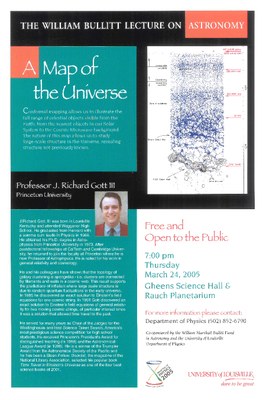Bullitt Lecture in Astronomy 2005 - A Map of the Universe
| When |
Mar 24, 2005
from 07:00 PM to 08:00 PM |
|---|---|
| Where | Gheens Science Hall & Rauch Planetarium |
| Add event to calendar |
|
Speaker: J. Richard Gott, III, Princeton University
 Abstract: Conformal mapping allows us to illustrate the full range of celestrial objects visible from the Earth, from the nearest objects in our Solar System to the Cosmic Microwave background. The nature of this map allows us to study large-scale sturcture in the Universe, revealing structure not previously known.
Abstract: Conformal mapping allows us to illustrate the full range of celestrial objects visible from the Earth, from the nearest objects in our Solar System to the Cosmic Microwave background. The nature of this map allows us to study large-scale sturcture in the Universe, revealing structure not previously known.
J. Richard Gott, III was born in Louisville Kentucky and attended Waggener High School. He graduated from Harvard with a summa cum laude in Physics in 1969. He obtained his Ph.D. degree in Astrophysics from Princeton University in 1973. After postdoctoral fellowships at CalTech and Cambridge University, he returned to join the faculty at Princeton where he is now Professor of Astrophysics. He is noted for his work in general relativity and cosmology. He and his colleagues have shown that the topology of galaxy clustering is spongelike - i.e. clusters are connected by filaments and walls in a cosmic web. This result supports the predictions of inflation where large scale structure is due to random quantum fluctuation in the early universe. In 1985 he discovered an exact solution to Einstein's field equations for one cosmic string. In 1991 Gott discovered an exact solution to Einstein's field equations of general relativity for two moving cosmic strings, of particular interest since it was a solution that allowed time travel to the past. He served for may years as Chair of the Judges for the Westinghouse and Intel Science Talent Search, America's most prestigious science competition for high school students. He received Princeton's President's Award for distinguished teaching (in 1998) and the Astronomical League Award (in 1998). He is a winner of the Trumpler Award from the Astronomical Society of the Pacific and he has been a Sloan Fellow. Booklist, the magazine of the National Library Association, selected his popular book "Time Travel in Einstein's Universe" as one of the four best science books of 2001.
